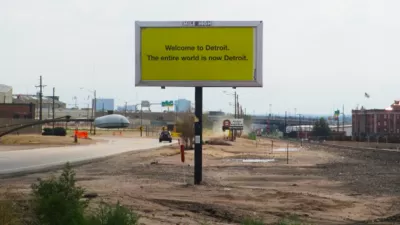The kinds of words and arguments people use to describe blight, foreclosure, and eviction reveals a lot of society's biases.

Kaeleigh Herstad provides a semantic analysis of rhetoric on the subjects of blight, foreclosure, and eviction in Detroit to reveal "local attitudes towards and concepts of ownership, poverty, race, and social justice."
Herstad spent two years documenting local media coverage of Detroit’s blight and foreclosure crises, and has identified a few pervasive themes. Herstad only needs one case study to illustrate these themes—the comments from a recent Detroit News article "about a negligent property owner, Jeffrey Cusimano, who does not pay property taxes or keep his properties up to code, yet faces no consequences for his actions."
Herstad identifies the following comments left on the article as indicative of larger themes, which she details thoroughly in the source article:
- “When someone plays the system like a fiddle, I tend to blame the system.”
- “Don’t you think that 19 evictions is more a reflection of the quality of tenants and their attitudes towards paying honest debts than it is of the system?”
- “And yet they have a dish on the roof.”
- “Why would anyone move in there in the first place? Did they expect it to magically transform? Hardly. It’s just an excuse to not pay.” and “Renters don’t take care of anything! Move in, destroy, move out.”
- The city should be giving this guy an award for even trying in Detroit. If he didn’t own these houses they would just be more shells to dump bodies in…” and “Who cares? Detroit is a Sewer!” and “Detroilet”
FULL STORY: The Rhetoric of Foreclosure and Eviction in Detroit

Maui's Vacation Rental Debate Turns Ugly
Verbal attacks, misinformation campaigns and fistfights plague a high-stakes debate to convert thousands of vacation rentals into long-term housing.

Planetizen Federal Action Tracker
A weekly monitor of how Trump’s orders and actions are impacting planners and planning in America.

San Francisco Suspends Traffic Calming Amidst Record Deaths
Citing “a challenging fiscal landscape,” the city will cease the program on the heels of 42 traffic deaths, including 24 pedestrians.

Defunct Pittsburgh Power Plant to Become Residential Tower
A decommissioned steam heat plant will be redeveloped into almost 100 affordable housing units.

Trump Prompts Restructuring of Transportation Research Board in “Unprecedented Overreach”
The TRB has eliminated more than half of its committees including those focused on climate, equity, and cities.

Amtrak Rolls Out New Orleans to Alabama “Mardi Gras” Train
The new service will operate morning and evening departures between Mobile and New Orleans.
Urban Design for Planners 1: Software Tools
This six-course series explores essential urban design concepts using open source software and equips planners with the tools they need to participate fully in the urban design process.
Planning for Universal Design
Learn the tools for implementing Universal Design in planning regulations.
Heyer Gruel & Associates PA
JM Goldson LLC
Custer County Colorado
City of Camden Redevelopment Agency
City of Astoria
Transportation Research & Education Center (TREC) at Portland State University
Jefferson Parish Government
Camden Redevelopment Agency
City of Claremont





























